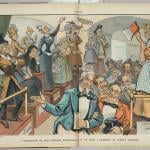Last updated on: November 26, 2011 at 1:53 pm
By
Scot McKnight
Good Morning!
 Michael Mercer, “For this I give thanks,” on what makes him grateful for his evangelical past.
Michael Mercer, “For this I give thanks,” on what makes him grateful for his evangelical past.
Nate Stratman, at The Burner, on the pastoral implications on youth for pastors.
Tony Jones on a napkin — the top 25 books in Christian history/theology/spiritual formation.
Thomas Froese: “KAMPALA, UGANDA—Remember Kienan Hebert, the three-year-old in one of Canada’s biggest feel-good stories of 2011? Kienan was abducted from his B.C. home and later returned by, of all people, his abductor. Twitter and Facebook lit up. Christians proclaimed God is alive and well and listening to prayer.” (HT: PH)
I’m glad John Stackhouse called our attention to the death of CS Lewis, on the same day JFK died.
Mark Regnerus on Catholic Contemporary Music — or lack thereof: “Our transition from evangelical to Catholic has shed light on the role of music in one’s faith tradition. (It’s also gratefully revealed little that’s distinctively Protestant about most CCM.) For many evangelicals, CCM is a hallmark of their cultural consumption patterns. Sure, there are different tastes and preferences, from the cheesy to the edgy, from the very to the barely (Christian). But one fact seems pretty clear: most performing artists in the CCM world run with evangelicals, so far as I can tell. Very few are Catholic. Why is that?”
Newt Gingrich, an overpaid historian? John Fea: “In a recent GOP presidential debate in which Gingrich was asked to explain why he earned $300,000 from Freddie Mac, the former Speaker of the House of Representatives claimed that he had given the mortgage company advice in his capacity as a historian. Later it was revealed that Gingrich had actually received between $1.6 and $1.8 million for his supposed work as a historical consultant. By one definition, Gingrich is a historian. He has a Ph.D. from Tulane University where he wrote a doctoral dissertation entitled “Belgian Education Policy in the Congo, 1945-1960.” He taught history at West Georgia College (now University of West Georgia) and, believe it or not, was influential in starting an environmental studies program there. When he did not receive tenure at West Georgia he set off on a political career….Is it really possible that the leadership of Freddie Mac wanted a historical consultant to help them think about the way in which the past, in this case the history of housing in America, informs the present? If so, why wouldn’t they hire someone who knows something about this field? It is more likely that Gingrich is not telling the truth.”
Brad Wright analyzes why some leave the faith: part one, part two.
Karl Giberson: “Survey results recently reported by Christianity Today clarify once again the sober truth that evangelicals are not making much progress in accepting well-established mainstream scientific ideas about origins. Particularly disturbing is the finding that only 27 percent of evangelical pastors “strongly disagree” with the statement that the earth is 6,000 years old. A higher number “strongly agree” that the earth is just 6,000 years old, a conclusion refuted by mountains of evidence. Seven in 10 evangelical pastors “strongly disagree” that “God used evolution to create people.”
Tim Dalrymple: “As it turns out, however, evangelical churches are arguably the least-politicized of all the major churches. At a recent meeting of the excellent Faith Angle Forum, David Campbell, author of American Grace: How Religion Divides and Unites Us, presented his updated research. When asked whether they heard sermons on political or social issues once a month or more, here is how America’s major religious groups responded:
- Jewish: 41.4%
- Non-affiliated: 30.5%
- Black Protestant: 29.6%
- Catholic: 20.7%
- Mainline Protestant: 16%
- Evangelical: 13.7%
I don’t have figures for Muslims, but the only religious group that definitely had a lower percentage of sermons on political/social issues was, interestingly, the Mormons. Only 2% of Mormons said that they heard a sermon on social/political issues at least once a month. (My thanks to Dr. Campbell for sharing the exact figures with me.) But isn’t it interesting that liberal secularists rarely complain about the “politicization” of the Black Protestant or Mainline Protestant churches?”
(more…)















